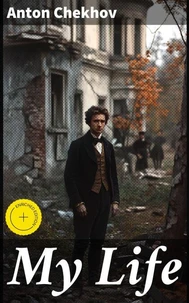Plays
Par : , , , ,Formats :
Disponible dans votre compte client Decitre ou Furet du Nord dès validation de votre commande. Le format ePub est :
- Compatible avec une lecture sur My Vivlio (smartphone, tablette, ordinateur)
- Compatible avec une lecture sur liseuses Vivlio
- Pour les liseuses autres que Vivlio, vous devez utiliser le logiciel Adobe Digital Edition. Non compatible avec la lecture sur les liseuses Kindle, Remarkable et Sony
 , qui est-ce ?
, qui est-ce ?Notre partenaire de plateforme de lecture numérique où vous retrouverez l'ensemble de vos ebooks gratuitement
Pour en savoir plus sur nos ebooks, consultez notre aide en ligne ici
- Nombre de pages646
- FormatePub
- ISBN859-65--4739984-1
- EAN8596547399841
- Date de parution13/11/2022
- Protection num.Digital Watermarking
- Taille452 Ko
- Infos supplémentairesepub
- ÉditeurDIGICAT
Résumé
In "Plays, " Anton Chekhov unveils a masterful collection of dramatic works that profoundly explore the complexities of human existence and the subtleties of relationships. Renowned for his innovative use of subtext and his ability to evoke deep emotions through seemingly simple dialogue, Chekhov's plays such as "The Cherry Orchard" and "Uncle Vanya" offer a rich tapestry of life in late 19th-century Russia.
Through a blend of humor and melancholy, he delves into themes of unfulfilled aspirations, social change, and the passage of time, illuminating the paradoxes of ordinary life while challenging the conventions of theatrical narrative. Chekhov's background as a physician and keen observer of human behavior profoundly influenced his writing. Born in 1860 in Taganrog, Russia, he used his insights from both medicine and personal experience to craft characters that are at once relatable and tragic.
His belief in the power of the theatre to reflect societal issues propelled him to write plays that transcended mere entertainment, cementing his legacy as a pivotal figure in modern drama. Highly recommended for both casual readers and scholars alike, Chekhov's "Plays" provides an insightful look into the intricacies of the human condition. Engaging with these texts not only enriches one's understanding of theatrical history but also offers an opportunity to reflect on the timeless themes that resonate across generations.
Through a blend of humor and melancholy, he delves into themes of unfulfilled aspirations, social change, and the passage of time, illuminating the paradoxes of ordinary life while challenging the conventions of theatrical narrative. Chekhov's background as a physician and keen observer of human behavior profoundly influenced his writing. Born in 1860 in Taganrog, Russia, he used his insights from both medicine and personal experience to craft characters that are at once relatable and tragic.
His belief in the power of the theatre to reflect societal issues propelled him to write plays that transcended mere entertainment, cementing his legacy as a pivotal figure in modern drama. Highly recommended for both casual readers and scholars alike, Chekhov's "Plays" provides an insightful look into the intricacies of the human condition. Engaging with these texts not only enriches one's understanding of theatrical history but also offers an opportunity to reflect on the timeless themes that resonate across generations.
In "Plays, " Anton Chekhov unveils a masterful collection of dramatic works that profoundly explore the complexities of human existence and the subtleties of relationships. Renowned for his innovative use of subtext and his ability to evoke deep emotions through seemingly simple dialogue, Chekhov's plays such as "The Cherry Orchard" and "Uncle Vanya" offer a rich tapestry of life in late 19th-century Russia.
Through a blend of humor and melancholy, he delves into themes of unfulfilled aspirations, social change, and the passage of time, illuminating the paradoxes of ordinary life while challenging the conventions of theatrical narrative. Chekhov's background as a physician and keen observer of human behavior profoundly influenced his writing. Born in 1860 in Taganrog, Russia, he used his insights from both medicine and personal experience to craft characters that are at once relatable and tragic.
His belief in the power of the theatre to reflect societal issues propelled him to write plays that transcended mere entertainment, cementing his legacy as a pivotal figure in modern drama. Highly recommended for both casual readers and scholars alike, Chekhov's "Plays" provides an insightful look into the intricacies of the human condition. Engaging with these texts not only enriches one's understanding of theatrical history but also offers an opportunity to reflect on the timeless themes that resonate across generations.
Through a blend of humor and melancholy, he delves into themes of unfulfilled aspirations, social change, and the passage of time, illuminating the paradoxes of ordinary life while challenging the conventions of theatrical narrative. Chekhov's background as a physician and keen observer of human behavior profoundly influenced his writing. Born in 1860 in Taganrog, Russia, he used his insights from both medicine and personal experience to craft characters that are at once relatable and tragic.
His belief in the power of the theatre to reflect societal issues propelled him to write plays that transcended mere entertainment, cementing his legacy as a pivotal figure in modern drama. Highly recommended for both casual readers and scholars alike, Chekhov's "Plays" provides an insightful look into the intricacies of the human condition. Engaging with these texts not only enriches one's understanding of theatrical history but also offers an opportunity to reflect on the timeless themes that resonate across generations.








